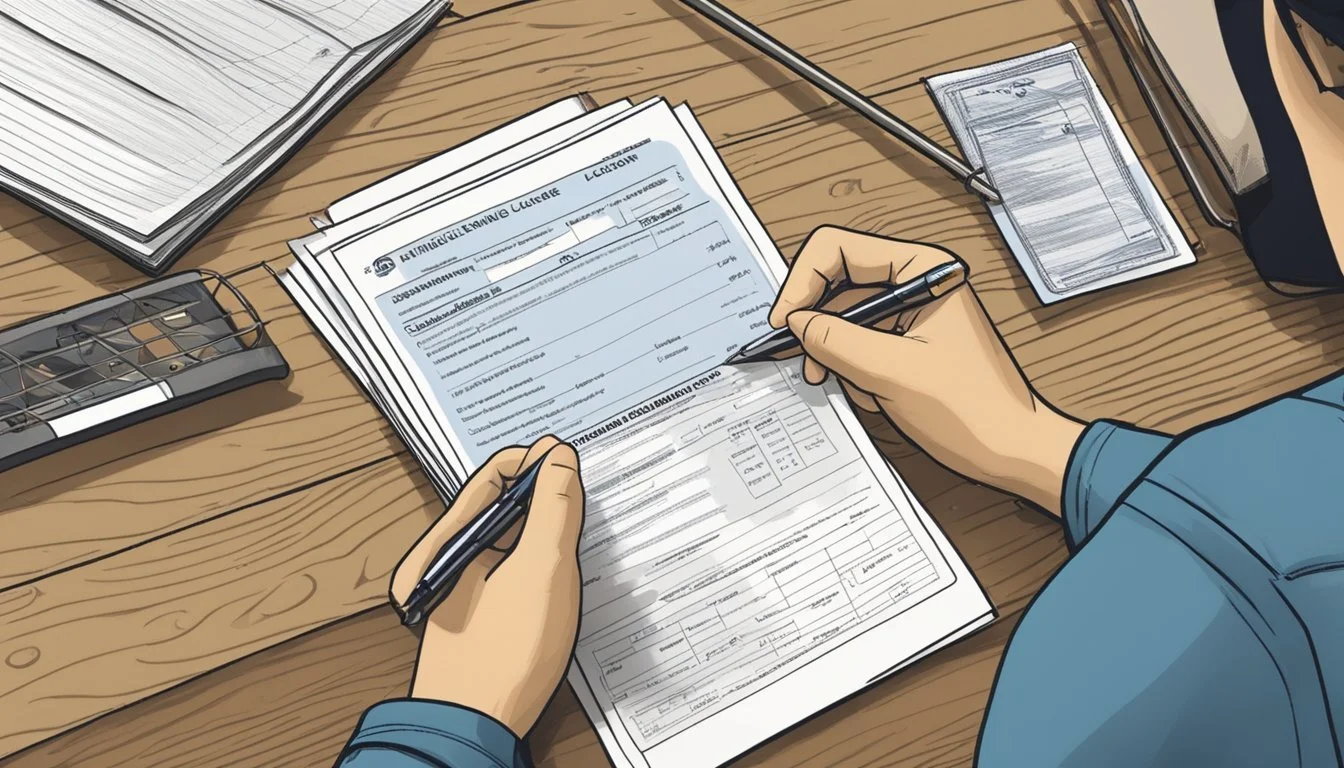How to Get a Missouri Freshwater Fishing License
Your Essential Guide
Securing a freshwater fishing license in Missouri is a straightforward process. The state offers various permits to suit different anglers' needs, including daily and annual options. Residents and nonresidents alike must comply with the state's regulations, which help conserve fisheries and ensure the sustainability of the sport.
Missouri's Department of Conservation provides detailed guides to assist anglers in navigating the rules regarding species, season, and fishing area limits. A license is a requirement for anyone 16 years of age and older unless they have a qualifying disability or other exemptions as defined by Missouri law. For those under the age of 16, a fishing permit is not mandatory, allowing younger enthusiasts to enjoy the sport freely in the company of licensed adults.
Residents of Missouri have access to additional permit options, such as lifetime or specialized area permits. Nonresidents, on the other hand, have a more limited selection and are generally required to obtain a daily or annual nonresident fishing permit. It is essential for all anglers to familiarize themselves with the specific fishing regulations for their intended locations to maintain compliance and to protect the state's aquatic resources.
Understanding Fishing in Missouri
Missouri offers a diverse range of freshwater fishing opportunities across its rivers, lakes, and streams. The state is known for its commitment to maintaining thriving habitats, and it imposes specific fishing regulations to protect its aquatic life.
Species and Habitats
Missouri is a haven for freshwater fish (What wine goes well with fish?) species, boasting everything from largemouth and smallmouth bass to trout and panfish. Habitats vary greatly, with the Ozarks region acclaimed for its trout-rich streams, while lakes and rivers elsewhere provide ideal conditions for bass and other species. The Missouri Department of Conservation actively manages these habitats to ensure the health and diversity of fish populations.
Common Freshwater Fish in Missouri:
Bass: Largemouth, Smallmouth, and Spotted
Trout: Primarily in the Ozarks region
Panfish: Includes species such as Bluegill and Crappie
Fishing Seasons and Regulations
Missouri enforces fishing seasons and regulations to sustain fish populations and ensure the enjoyment of the sport for future generations. The state delineates specific fishing areas and provides a clear set of rules for each. These rules include limits on the size and number of fish that can be taken, as well as the methods used for fishing.
Key Regulations:
Black Bass: Open year-round in the Mississippi River and other specific waters
Trout Permit: Required for trout fishing in designated areas
Conservation Order Permit: May be required during certain seasons and for specific methods
Anglers should always check the latest Missouri Fishing Regulations before heading out to fish, as regulations can vary by season and area. Compliance with these rules supports conservation efforts and contributes to the ongoing health of Missouri's freshwater fisheries.
Eligibility Requirements for a Fishing License
To fish in Missouri waters, individuals must meet specific age and residency requirements and may qualify for exemptions under certain conditions.
Age Requirements
Residents and non-residents over the age of 16 are required to have a fishing license to legally fish in Missouri freshwater bodies. Children under 16 are exempt and do not need a license.
Residency Requirements
Residency plays a crucial role in license eligibility and cost. A Missouri resident is someone who has lived in the state for at least 30 days. This includes military personnel, veterans, federal employees, and students who can prove they are living in Missouri for purposes other than vacation. Non-residents, which include anyone not meeting these criteria, are also eligible for licenses but may face different fees and permit options.
Special Exemptions and Considerations
Missouri offers special exemptions for individuals who may have difficulties obtaining a license through standard procedures. Persons with cerebral palsy or those confined to wheelchairs, as well as honorably discharged veterans, may be eligible for exemption. Additionally, members of an honorably discharged veteran's immediate household may qualify for resident permits.
Types of Fishing Licenses in Missouri
In Missouri, a variety of fishing licenses cater to different kinds of anglers, from those planning a single day of fishing to those investing in a lifetime of angling experiences.
Annual and Daily Licenses
Annual Fishing Permits are available for Missouri residents, offering a year's worth of fishing opportunities in state waters. For shorter fishing trips or occasional anglers, Daily Fishing Permits offer a flexible option, allowing for the legal fishing of species as outlined by Missouri regulations on a per-day basis.
Lifetime Licenses and Permits
Missouri also provides Lifetime Fishing Permits and a Lifetime Conservation Partner Permit for those dedicated to fishing and conservation. These lifetime options ensure that anglers can enjoy the Ozarks, smallmouth bass fishing, and more, without the need for annual renewals.
Specialized Permits and Tags
Certain species and fishing activities in Missouri require additional permits beyond the standard fishing license. Trout Fishing Tags and permits for other specific species are necessary for legally targeting these fish. On Free Fishing Days, anglarians get the opportunity to fish without a permit, experiencing the joys of fishing in a manageable and regulated manner.
Fishing Licenses for Nonresidents
Nonresidents are also welcome to fish in Missouri's diverse freshwater habitats. They can purchase an Annual Fishing License or opt for Daily Permits depending on their stay duration. Specialized permits like the Daily Trout Fishing Tag are also available to nonresident anglers at different costs compared to residents.
How to Purchase a Missouri Fishing License
Missouri offers several convenient methods for anglers to purchase a fishing license. They can choose to buy their licenses online, in-store at local vendors, over the phone, by mail, or through the MO Fishing App. Each method provides a streamlined process to ensure fishermen can get their permits easily and start fishing without delay.
Buying Online
Purchasers can obtain their fishing licenses directly from the Missouri Department of Conservation (MDC) website. This online service is available 24/7, offering a quick and secure way to get a license using a credit card. First-time buyers will create an account, and returning customers can log in to buy their licenses or utilize the permit auto-renewal service.
Local Vendors and Retail Options
Local vendors such as bait and tackle shops, sporting goods stores, and various retailers provide in-person options to buy a fishing license. These brick-and-mortar locations assist customers who prefer a face-to-face transaction or those who may not have internet access.
Phone and Mail Order Methods
For those who prefer to purchase their Missouri fishing license over the phone, they can dial a dedicated number provided by MDC. The phone service is a convenient option for individuals who are not internet-savvy. Mail order purchases are also available by sending a request to the MDC, which could be an alternative for those who plan ahead, as this method requires additional processing time.
Using the MO Fishing App
The MO Fishing App is a user-friendly mobile application available for both iOS and Android users. It provides a convenient option for purchasing licenses and permits right from one's smartphone. The app not only allows users to buy their permits but also to store them digitally, eliminating the need for a physical copy.
Costs and Fees Associated with Fishing Licenses
Missouri offers a variety of fishing licenses to suit different needs, and the costs are structured accordingly. Whether one is a resident angler or visiting from out of state, understanding these costs ensures compliance with state regulations.
Standard License Fees
Resident Fishing License Fees:
Annual: $12 for individuals aged 16-64
Daily: $8 regardless of age
Non-Resident Fishing License Fees:
Annual: $49 for individuals aged 16 and older
Daily: $8 for all ages
Resident and non-resident fees provide access to fishing in Missouri's freshwater bodies. Diverse options, like the daily licenses, cater to short-term fishing trips, while annual licenses are more economical for regular anglers.
Discounts and Reduced Fees
Missouri offers reduced fees for certain groups, ensuring more individuals can enjoy fishing:
Seniors (Age 65 and older): Residents can purchase an annual license for $7.
Lifetime Licenses: Residents under the age of 16 may purchase a license valid for the holder's lifetime for $300.
These concessions are designed to encourage fishing as a lifelong recreation for Missourians of all ages, particularly benefiting the young and the elderly.
Additional Tags and Permit Fees
Besides the basic fees, special tags and permits may be required for particular species or areas. While standard license fees cover most fishing activities, these additional costs must be considered for certain fishing endeavors:
Trout Permit: Required for fishing trout parks and managing trout populations.
Conservation Order Permit: Necessary for certain seasons and types of wildlife.
It is imperative for anglers to check the latest regulations and additional permit requirements before planning their fishing trips to avoid any legal complications.
Additional Hunting Permits and Considerations
When pursuing outdoor activities such as hunting in Missouri, individuals must be aware of the various permits required for different game species. This includes small game and birds, recognizing the utility of combination permits, and understanding federal regulations for hunting migratory birds.
Small Game and Bird Hunting
For hunters targeting small game species like squirrels and rabbits, or game birds such as quail (What wine goes well with quail?), pheasants, and turkey, appropriate permits are essential. A Small Game Hunting Permit is required, and for those pursuing turkey, a specific Turkey Hunting Permit is needed. Waterfowl hunters must ensure they have both state and federal permissions before setting out.
Fishing and Hunting Combination Permits
Anglers and hunters in Missouri may benefit from a Resident Hunting and Fishing Permit, which covers both activities. This is particularly advantageous for individuals who regularly partake in both fishing and hunting throughout the year. For trout fishing, an additional Trout Permit is required to legally fish in designated trout parks and trout areas around the state.
Federal Requirements for Migratory Bird Hunting
To hunt migratory birds—including ducks, (What wine goes well with duck?) geese, teal, woodcock, snipe, and other waterfowl—a Migratory Bird Hunting Permit (also known as the Duck Stamp) is mandatory. This federal requirement is in addition to any state-issued hunting permits. Hunters must carry proof of purchase of the Federal Duck Stamp when in the field.
Note: All hunters must have successfully completed an approved hunter education program to buy firearms hunting permits, which is also a prerequisite for many of these additional permits.
Legal Considerations and Compliance
When obtaining a Missouri freshwater fishing license, the angler is responsible for understanding and following state-specific legal requirements. Compliance ensures the preservation of Missouri's natural resources and contributes to conservation efforts.
Understanding Fishing Regulations
In Missouri, anglers must observe the rules of the Wildlife Code of Missouri. These regulations are designed to manage fish populations effectively and protect the ecosystem. It is imperative for fishermen to know these rules, which dictate everything from which species may be fished to the use of specific types of bait and tackle.
Catch Limits and Size Restrictions
Missouri enforces catch limits and size restrictions to maintain healthy fish populations. For example:
Trout Parks: Specific catch limits apply, and they may change depending on the season and the fishing area.
General Freshwater Areas: Different limits are in place for various species, and these are clearly outlined in the Missouri fishing regulations guide.
It's essential for fishermen to familiarize themselves with these limitations before heading out to fish.
Protected Areas and Conservation Efforts
Certain areas in Missouri are designated as protected, meaning fishing may be restricted or prohibited to preserve biodiversity. Here are key points regarding conservation:
Conservation Areas: Special rules can apply, and not all conservation areas allow fishing.
Natural Resources: Compliance with regulations helps in the protection and regeneration of habitats and natural resources.
Anglers must ensure they are not fishing in prohibited areas and that they're contributing positively to conservation efforts by following all established rules and guidelines.
Additional Activities and Harvesting Permits
Besides acquiring a fishing permit in Missouri, individuals looking to engage in the collection or use of other species and bait have specific regulations and requirements to follow. These additional permits ensure sustainable practices for various aquatic species across the state.
Harvesting of Frogs, Mussels, and Other Species
In Missouri, a fishing permit allows the holder to harvest not only fish but also frogs, mussels, (What wine goes well with mussels?) clams (how long do clams last?), turtles, and crayfish. Each species has its season, limits, and methods specified by the Missouri Department of Conservation (MDC) to ensure that harvesting is conducted in a sustainable manner. For example:
Frogs: May be harvested during the designated frog season, with daily limits set to control populations.
Mussels/Clams: Collection may be restricted to certain areas and times to protect sensitive species and habitats.
Using Live Bait and Catch and Release Practices
Using live bait such as minnows, worms, and crayfish is a common practice in Missouri fishing, but it also comes with specific regulations to prevent the spread of invasive species and maintain ecological balance. Live bait must be caught or acquired in a manner that is in accordance with Missouri’s conservation guidelines. In addition, catch and release practices are encouraged, especially in areas where fish populations need to be conserved or are under specific size or number limitations. Fishermen should familiarize themselves with these practices:
Live Bait: Regulations specify where and how live bait can be collected and used.
Catch and Release: Recommended techniques and handling practices to ensure the survival of released fish.
Support and Resources
The Missouri Department of Conservation (MDC) provides comprehensive support and resources for anglers seeking to obtain a freshwater fishing license in Missouri. These include direct assistance through various channels and educational opportunities for both new and experienced fishermen.
Missouri Department of Conservation Assistance
The MDC offers personalized assistance to help anglers understand fishing permit requirements, limits, and regulations. Guidance is accessible through:
Phone Support: Anglers can contact the MDC directly for assistance.
MDC App: A convenient mobile application provides information on the go.
Online Resources: The official MDC website contains detailed information on permits, including fees and regulations.
They ensure assistance is readily available for those who need it, including registered students seeking to verify their student status for potential discounts or exemptions.
Educational Resources and Workshops
Alongside regulatory support, the MDC offers educational resources aimed at enhancing the fishing experience:
Guides and Brochures: They provide materials detailing various species, techniques, and conservation methods.
Workshops: The MDC conducts workshops for anglers of all skill levels. These workshops cover a range of topics, from basic fishing techniques to specialized tactics for experienced anglers.
Rod-and-Reel Loaner Program: This program allows individuals to borrow fishing equipment, making the sport more accessible to those who do not own gear.
By utilizing these resources, anglers can broaden their knowledge, stay informed about conservation practices, and enjoy Missouri's rich fishing opportunities.
Additional Information for Neighboring State Residents
Residents of states bordering Missouri may have specific provisions and agreements that make the process of obtaining a Missouri fishing license unique. These agreements aim to facilitate fishing activities for residents who live near state boundaries.
Reciprocal Licensing for Bordering States
Some bordering states have reciprocal licensing agreements with Missouri. This means that residents of these states may not need to purchase a non-resident Missouri fishing license if they hold a valid fishing license from their home state. It's important for anglers to verify the terms of these agreements, as they can vary and may only apply to certain border waterways.
Special Considerations for Kansas and Kentucky Residents
Kansas Residents:
Fishing on the Missouri River: Kansas residents may fish in Missouri waters of the Missouri River without a Missouri fishing license, as long as they have a valid Kansas fishing license.
Other Waters: For all other bodies of water in Missouri, Kansas residents are required to obtain a non-resident Missouri fishing license.
Kentucky Residents:
Reciprocity Arrangements: Kentucky residents should check for any current reciprocity arrangements, as these can change and might allow fishing in Missouri waters under certain conditions.
Required Licensing: If no reciprocal agreements are in place, Kentucky residents will need to purchase a non-resident fishing license to fish in Missouri.
Border state anglers should always stay informed about the current regulations and any changes to reciprocal agreements before planning their fishing trips.
Maintaining Your Fishing License
Once an angler has their Missouri fishing license, maintaining it involves straightforward processes for renewal and addressing cases of loss or damage.
Renewal Process and Auto-Renewal Service
Renewing a Missouri fishing license is a simple task that can often be completed online through the Missouri Department of Conservation's website. A person’s fishing license can be set to auto-renew, preventing any lapse in legality. The timeframe for renewal varies; however, individuals should check the expiration date on their license and renew before that date passes to continue fishing without interruption.
Lost or Damaged Licenses
If one's license is lost or damaged, the Missouri Department of Conservation provides a mechanism for obtaining a duplicate. Anglers should report the loss and request a replacement as soon as possible to remain compliant with state regulations. There may be a fee for this service, and the replacement process can generally be completed either online or in-person at a local department office.
Community Involvement and Events
Engaging in Missouri's freshwater fishing community involves participation in organized events and conservation efforts. These activities foster environmental stewardship and provide opportunities for individuals to enjoy fishing as a pastime.
Participation in Free Fishing Days
Missouri Department of Conservation offers Free Fishing Days annually, during which anyone can fish without a permit. These days encourage newcomers and seasoned anglers alike to experience fishing in Missouri's freshwater systems. They typically occur in early June and provide an excellent opportunity to learn about local fish species, fishing techniques, and conservation practices.
Conservation Programs and Volunteer Opportunities
Missouri's commitment to conservation is evident in its variety of programs that involve the public. Individuals can volunteer to assist with fish habitat improvement projects, stream cleanups, and educational outreach events. These programs aim to maintain healthy fish populations and water quality, ensuring the sustainability of Missouri's freshwater ecosystems for future generations.












